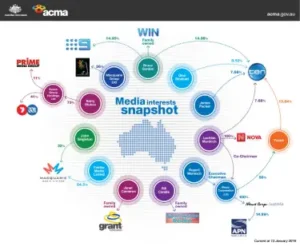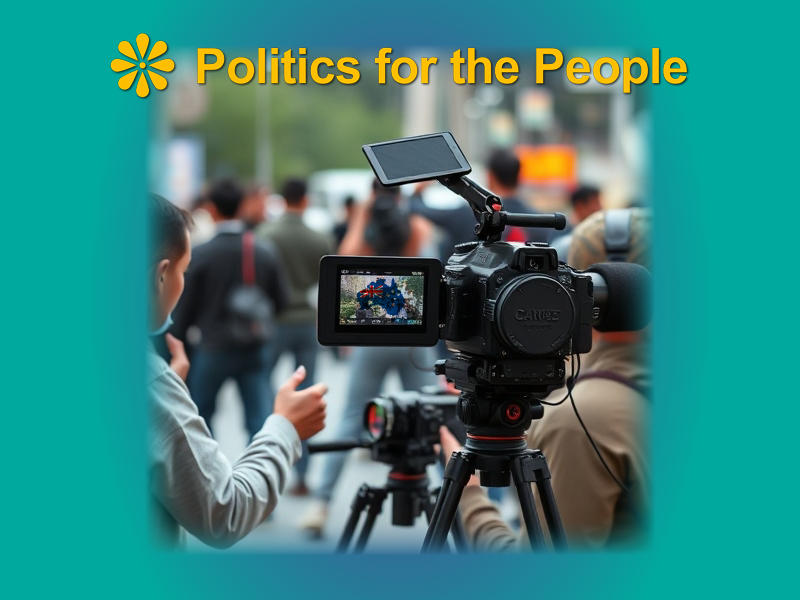Introduction
In the robust framework of democracy, the essence of an informed public opinion is paramount. However, when the information feeding this opinion is manipulated by those in power, the very foundation of democracy is shaken.
In Australia, sophisticated strategies by governments, corporations, and powerful entities not only shape public opinion but also steer it to serve specific agendas. This manipulation fosters division and obscures the true causes of societal challenges, affecting everything from environmental policies to social justice.
Media Influence Australia Needs Control
Media Ownership in Australia

Australia’s media landscape is among the most concentrated in the democratic world, with a handful of powerful media moguls, such as News Corp and Nine Entertainment, controlling most of the print, television, and digital outlets. This dominance allows a small group of individuals and corporations to wield disproportionate influence over national discourse, shaping public narratives in ways that align with their economic, ideological, and political interests.
The lack of media diversity means that alternative perspectives are often excluded, resulting in an information ecosystem where public opinion is heavily skewed.
This concentration of ownership has profound implications for democracy. By controlling what stories are covered—and how they are framed—media moguls can influence elections, policy debates, and public perceptions on critical issues such as climate change, economic inequality, and immigration.
For example, reports have shown that major outlets often promote policies favourable to corporate interests while undermining political parties or movements that challenge neoliberal agendas. The unbalanced representation of voices in the media stifles meaningful debate and reduces the public’s ability to make informed decisions.
Furthermore, investigative journalism—which plays a vital role in holding governments and corporations accountable—has been weakened by financial cutbacks in favour of opinion pieces and sensationalism that generate higher profits.
To restore fairness and integrity in Australian media, there is an urgent need for reforms that encourage greater media diversity and transparency in ownership. Policies such as stricter anti-monopoly laws, publicly funded independent media outlets, and increased support for community-driven journalism can help ensure that the public receives balanced, fact-based reporting.
Effects of Media Bias
The impact of media bias in Australia extends far beyond political preferences—it distorts reality, misleads citizens, and contributes to a fractured society. When media outlets present information through a filtered or partisan lens, they obscure the truth, amplify fears, and manipulate narratives to serve specific interests.
For example, coverage of issues like climate change or immigration is often framed in a way that promotes fear, scepticism, or scapegoating, steering public sentiment toward solutions that align with corporate or political agendas.
This distortion of facts not only erodes public trust in the media but also fuels societal polarization. Different sections of the population are exposed to completely divergent versions of reality based on their preferred media sources, deepening ideological divides, and fostering mistrust between groups.
For instance, the framing of economic issues, Indigenous rights, or healthcare reform can be heavily politicized, leading to misinformed or emotionally charged opinions. The result is a society where meaningful dialogue becomes difficult, as citizens lack a shared understanding of the facts.
Moreover, media bias often serves as a barrier to addressing systemic issues. By deflecting blame, minimizing criticism of corporate malfeasance, or suppressing dissenting voices, biased reporting prevents the public from holding decision-makers accountable. In a democratic society, this undermines the very principles of informed citizenry and open debate, leaving voters vulnerable to manipulation.
Political Manoeuvring and Public Misdirection
The Role of Spin Doctors
Spin doctors—political strategists who craft persuasive and emotive narratives—play a significant role in shaping public perception in Australian politics. By skilfully employing manipulative language, selective facts, and rhetorical tactics, spin doctors deflect attention from government failures and policy shortcomings, directing public frustration toward convenient scapegoats.
This technique is often seen during crises or contentious debates, where blame is shifted onto immigrants, minorities, unions, or other states rather than addressing the root causes of issues like economic mismanagement, stagnant wages, or climate inaction.
One common tactic involves weaponizing emotive language to stir fear or anger. For example, phrases like “border security” or “flood of immigrants” are designed to trigger visceral reactions, distracting citizens from underlying structural problems.
Similarly, slogans like “budget repair” are used to justify cuts to essential services while shielding the government from accountability. Spin doctors also exploit the 24-hour news cycle, capitalizing on short attention spans and sensational headlines to dominate public discourse and bury inconvenient truths.
The result is a misdirected electorate that is more likely to vote based on emotion rather than critical analysis. Public attention is still focused on divisive or symbolic issues, while pressing concerns—such as corporate tax avoidance, housing affordability, and the erosion of public services—receive limited scrutiny.
This manipulation undermines democracy by discouraging informed debate and fostering cynicism toward politics, as voters become increasingly frustrated with a system that seems incapable of delivering meaningful solutions.
To counter these tactics, Australians must demand greater transparency and integrity in political communication. Media literacy programs, fact-checking initiatives, and robust independent journalism are essential tools for empowering citizens to critically analyse political narratives and hold leaders accountable.
Only through a more informed and engaged public can Australia begin to dismantle the influence of spin doctors and prioritize evidence-based policymaking that serves the common good.
Consequences of Political Scapegoating
The impact of this political scapegoating is a more divided electorate, which can stymie effective governance. As the public squabbles over red herrings, significant legislative and policy challenges, such as climate change or health care reform, receive less attention and debate than they urgently need.
The Undue Influence of Corporations
Corporate Lobbying Explained
Corporations in Australia exert considerable influence over public policy through extensive lobbying efforts. By investing in political campaigns and engaging lobbyists, these entities push for legislation that helps their business interests, often at the expense of the public good.
This behind-the-scenes influence is typically opaque, with little transparency about how decisions are made or who is influencing them.
Impact on Policy and Society
This corporate influence often results in policies that prioritize business interests over environmental conservation, public health, and economic equality. As a result, laws and regulations may be skewed to favour the wealthy and powerful, worsening inequality and undermining the democratic process.
The Algorithmic Bias of Social Media
Social media platforms use algorithms to curate and present content that maximizes user engagement. These algorithms tend to create and reinforce echo chambers—spaces where users are exposed to views that align with their own. This mechanism exploits natural human tendencies towards confirmation bias, significantly affecting public discourse and increasing polarization.
Conclusion and Call to Action
The influence of media, politics, and corporate interests on public opinion in Australia is a critical challenge to the integrity of our democracy. As engaged citizens, it is our responsibility to critically evaluate the information we consume and to demand higher standards of transparency and accountability from those in power.
Question for Readers
Have you noticed an instance where your opinions were shaped by media bias or political spin? How did it affect your perspective on the issues?
Call to Action
Step forward and take part actively in the democratic process. Challenge narratives, verify sources, and demand clarity and accountability from media and political figures. By doing so, we can hope to foster a more informed, fair, and representative public discourse.

